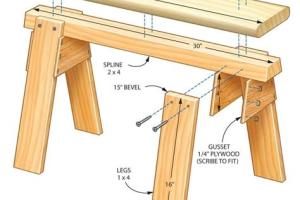Ultimate Guide to Building a DIY Saw Horse: Step-by-Step Instructions

-
Quick Links:
- Introduction
- Materials Needed
- Tools Required
- Design Options
- Step-by-Step Guide
- Expert Insights
- Case Studies
- Maintenance Tips
- Conclusion
- FAQs
Introduction
Building a saw horse is a fundamental skill for anyone engaged in woodworking or DIY projects. A saw horse provides a stable platform for cutting, sanding, and assembling materials. In this guide, we will walk you through everything you need to know to build your own saw horse, ensuring it meets your needs for durability and functionality.
Materials Needed
To begin building your saw horse, you will need the following materials:
- 2x4 lumber (8 feet long)
- 2x4 lumber (4 feet long)
- Wood screws (3-inch)
- Wood glue
- Sandpaper (medium and fine grit)
- Wood stain or paint (optional)
Tools Required
Gather the following tools to ensure a smooth building process:
- Measuring tape
- Power saw (circular or miter saw)
- Drill with drill bits
- Level
- Clamps
- Safety goggles
- Work gloves
Design Options
There are several designs available for saw horses, each suited for different needs:
- Basic Saw Horse: Simple and effective, ideal for general use.
- Folding Saw Horse: Portable design for easy storage.
- Adjustable Height Saw Horse: Offers flexibility for various projects.
Step-by-Step Guide
Follow these detailed steps to build your saw horse:
1. Measure and Cut the Lumber
Start by measuring and cutting your 2x4 lumber. You will need:
- Two 4-foot long pieces for the top
- Four 2-foot long pieces for the legs
- Two 3-foot long pieces for the bracing
2. Assemble the Top
Lay the two 4-foot pieces parallel and attach them using wood screws. Add wood glue for extra strength.
3. Attach the Legs
Attach the 2-foot legs to the ends of the top, ensuring they form a right angle. Use screws to secure them firmly.
4. Add Bracing
Position the 3-foot bracing pieces diagonally between the legs for added stability. Secure with screws.
5. Sand and Finish
Sand all surfaces to remove splinters. If desired, apply wood stain or paint for aesthetic appeal and protection.
Expert Insights
According to woodworking experts, the quality of materials directly impacts the longevity of your saw horse. Opt for pressure-treated wood if you’ll be working outdoors, as it withstands the elements better.
Case Studies
Many DIY enthusiasts have turned to build their own saw horses, enhancing their woodworking skills. For instance, a community workshop reported a 60% increase in project completion rates after members built their own saw horses.
Maintenance Tips
To ensure your saw horse lasts, consider the following maintenance tips:
- Regularly inspect for loose screws and tighten as necessary.
- Store in a dry place to prevent warping.
- Re-sand and re-stain the wood every couple of years.
Conclusion
Building a saw horse is not only a practical woodworking project but also enhances your DIY skills. By following this guide, you can create a robust and reliable saw horse tailored to your needs.
FAQs
1. What is the best wood to use for a saw horse?
Softwoods like pine or fir are commonly used, but hardwoods offer better durability.
2. Can I use recycled wood for my saw horse?
Yes, as long as the wood is in good condition and free from rot or damage.
3. How much weight can a saw horse hold?
A standard saw horse can support between 500 to 1,000 pounds, depending on its design and materials.
4. Is it difficult to build a saw horse?
No, with basic tools and materials, it's a straightforward project suitable for beginners.
5. How long does it take to build a saw horse?
Most DIYers can complete this project in about 2-4 hours, depending on skill level.
6. Can I make a folding saw horse?
Yes, several designs allow for a folding mechanism, making them portable and easy to store.
7. What tools do I need to build a saw horse?
A circular saw, drill, measuring tape, and clamps are essential for building a saw horse.
8. How can I improve the stability of my saw horse?
Adding diagonal bracing and using thicker lumber can significantly enhance stability.
9. Should I paint my saw horse?
Painting or staining can protect the wood and improve its appearance, especially for outdoor use.
10. Can I use a saw horse for other projects?
Yes, saw horses can also be used for supporting other woodworking projects, as a workbench, or for staging materials.